MGT600 Reflective Analysis: People, Team Management Report
VerifiedAdded on 2022/08/12
|6
|1285
|24
Report
AI Summary
This report provides a reflective analysis of the key principles and theories underlying strategic people management, communication, and problem-solving skills within organizations. It explores the importance of human resource management in achieving organizational goals, emphasizing the need for effective communication, leadership, and the ability to address challenges in a dynamic environment. The report covers topics such as strategic HR management, communication effectiveness, problem-solving techniques, workplace challenges, and the role of innovation and leadership in organizational success. The author concludes that strategic management enhances communication between organizational goals and human resources, promoting creativity and providing equal opportunities for talent. The report references various sources to support its arguments and analysis.
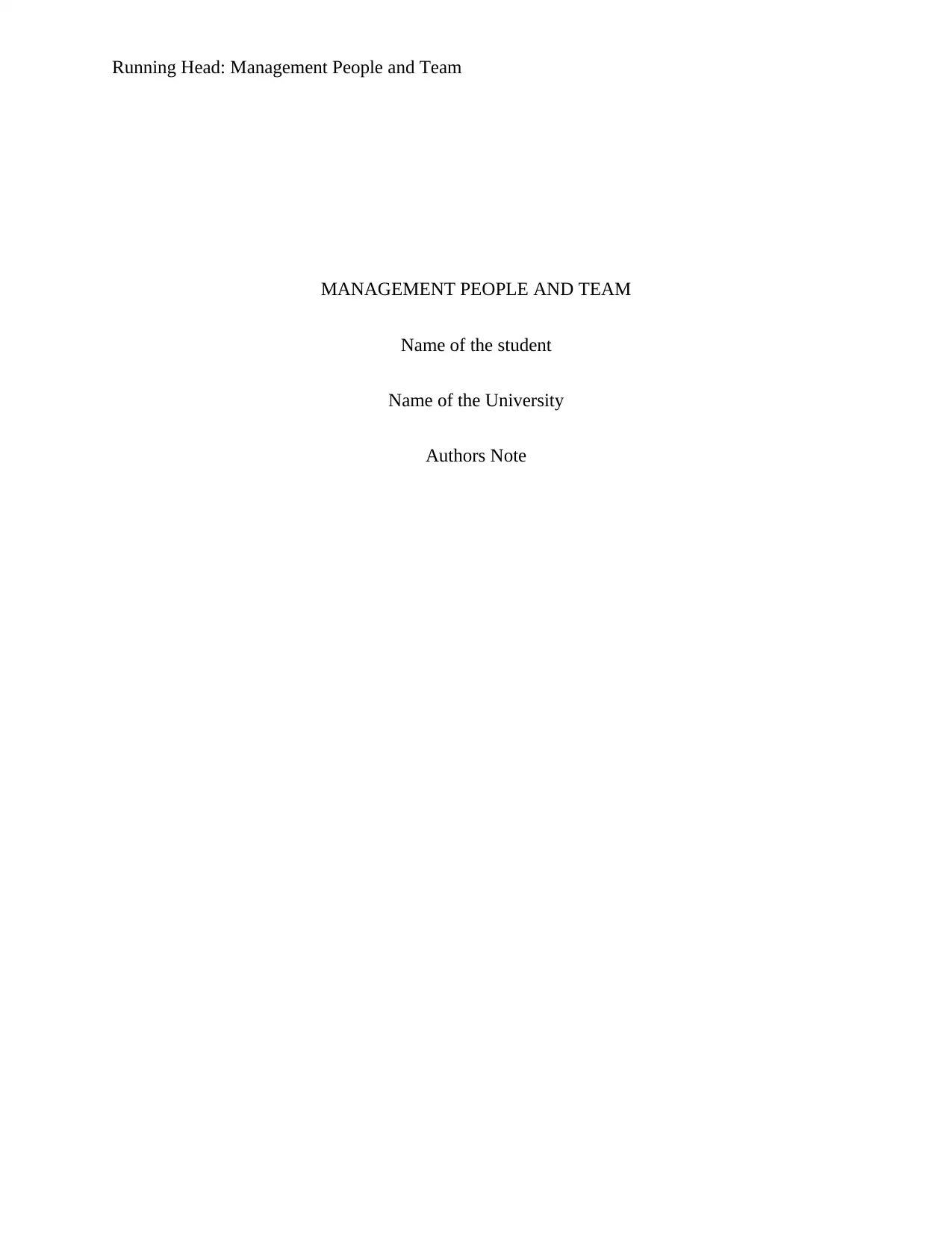
Running Head: Management People and Team
MANAGEMENT PEOPLE AND TEAM
Name of the student
Name of the University
Authors Note
MANAGEMENT PEOPLE AND TEAM
Name of the student
Name of the University
Authors Note
Paraphrase This Document
Need a fresh take? Get an instant paraphrase of this document with our AI Paraphraser
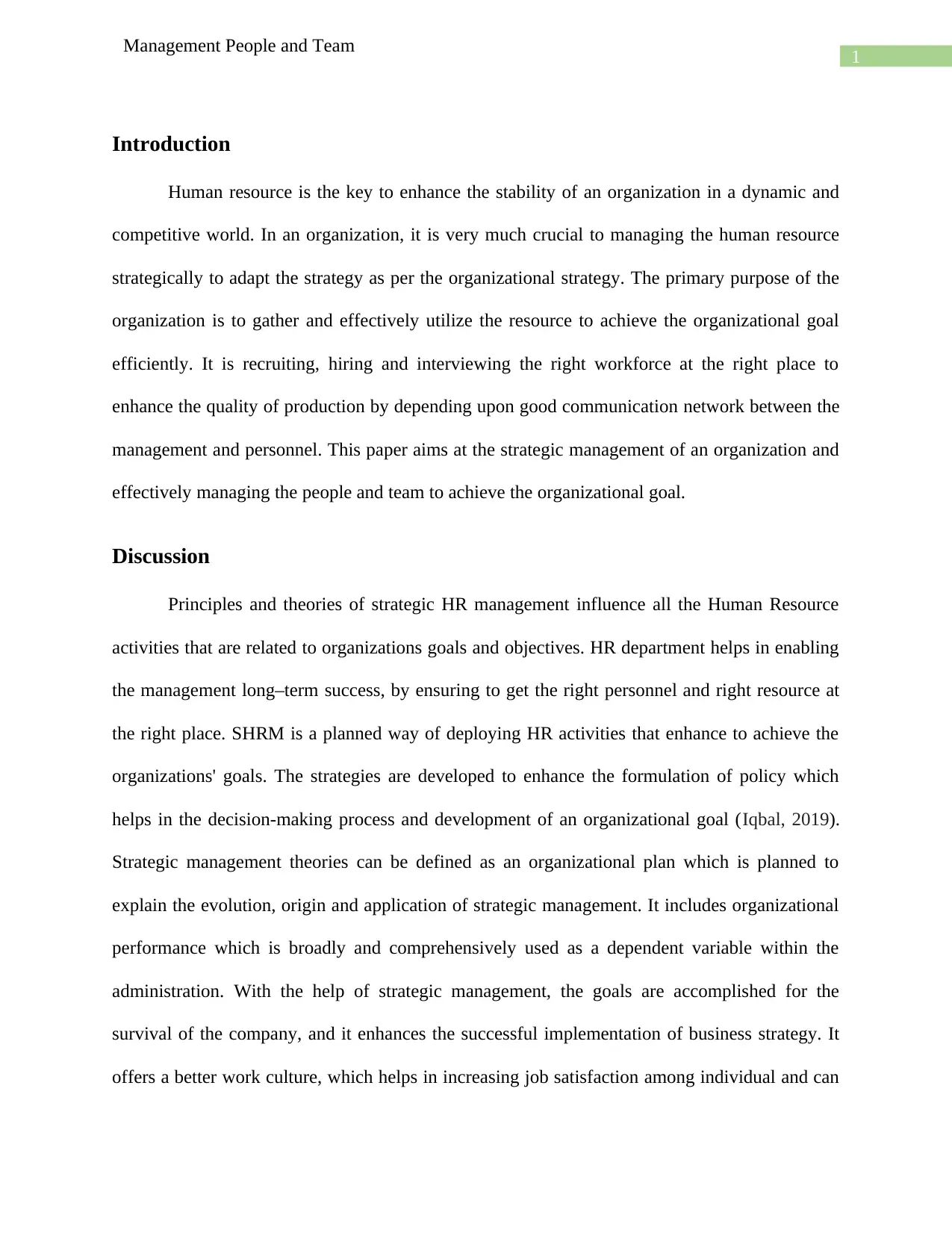
1
Management People and Team
Introduction
Human resource is the key to enhance the stability of an organization in a dynamic and
competitive world. In an organization, it is very much crucial to managing the human resource
strategically to adapt the strategy as per the organizational strategy. The primary purpose of the
organization is to gather and effectively utilize the resource to achieve the organizational goal
efficiently. It is recruiting, hiring and interviewing the right workforce at the right place to
enhance the quality of production by depending upon good communication network between the
management and personnel. This paper aims at the strategic management of an organization and
effectively managing the people and team to achieve the organizational goal.
Discussion
Principles and theories of strategic HR management influence all the Human Resource
activities that are related to organizations goals and objectives. HR department helps in enabling
the management long–term success, by ensuring to get the right personnel and right resource at
the right place. SHRM is a planned way of deploying HR activities that enhance to achieve the
organizations' goals. The strategies are developed to enhance the formulation of policy which
helps in the decision-making process and development of an organizational goal (Iqbal, 2019).
Strategic management theories can be defined as an organizational plan which is planned to
explain the evolution, origin and application of strategic management. It includes organizational
performance which is broadly and comprehensively used as a dependent variable within the
administration. With the help of strategic management, the goals are accomplished for the
survival of the company, and it enhances the successful implementation of business strategy. It
offers a better work culture, which helps in increasing job satisfaction among individual and can
Management People and Team
Introduction
Human resource is the key to enhance the stability of an organization in a dynamic and
competitive world. In an organization, it is very much crucial to managing the human resource
strategically to adapt the strategy as per the organizational strategy. The primary purpose of the
organization is to gather and effectively utilize the resource to achieve the organizational goal
efficiently. It is recruiting, hiring and interviewing the right workforce at the right place to
enhance the quality of production by depending upon good communication network between the
management and personnel. This paper aims at the strategic management of an organization and
effectively managing the people and team to achieve the organizational goal.
Discussion
Principles and theories of strategic HR management influence all the Human Resource
activities that are related to organizations goals and objectives. HR department helps in enabling
the management long–term success, by ensuring to get the right personnel and right resource at
the right place. SHRM is a planned way of deploying HR activities that enhance to achieve the
organizations' goals. The strategies are developed to enhance the formulation of policy which
helps in the decision-making process and development of an organizational goal (Iqbal, 2019).
Strategic management theories can be defined as an organizational plan which is planned to
explain the evolution, origin and application of strategic management. It includes organizational
performance which is broadly and comprehensively used as a dependent variable within the
administration. With the help of strategic management, the goals are accomplished for the
survival of the company, and it enhances the successful implementation of business strategy. It
offers a better work culture, which helps in increasing job satisfaction among individual and can
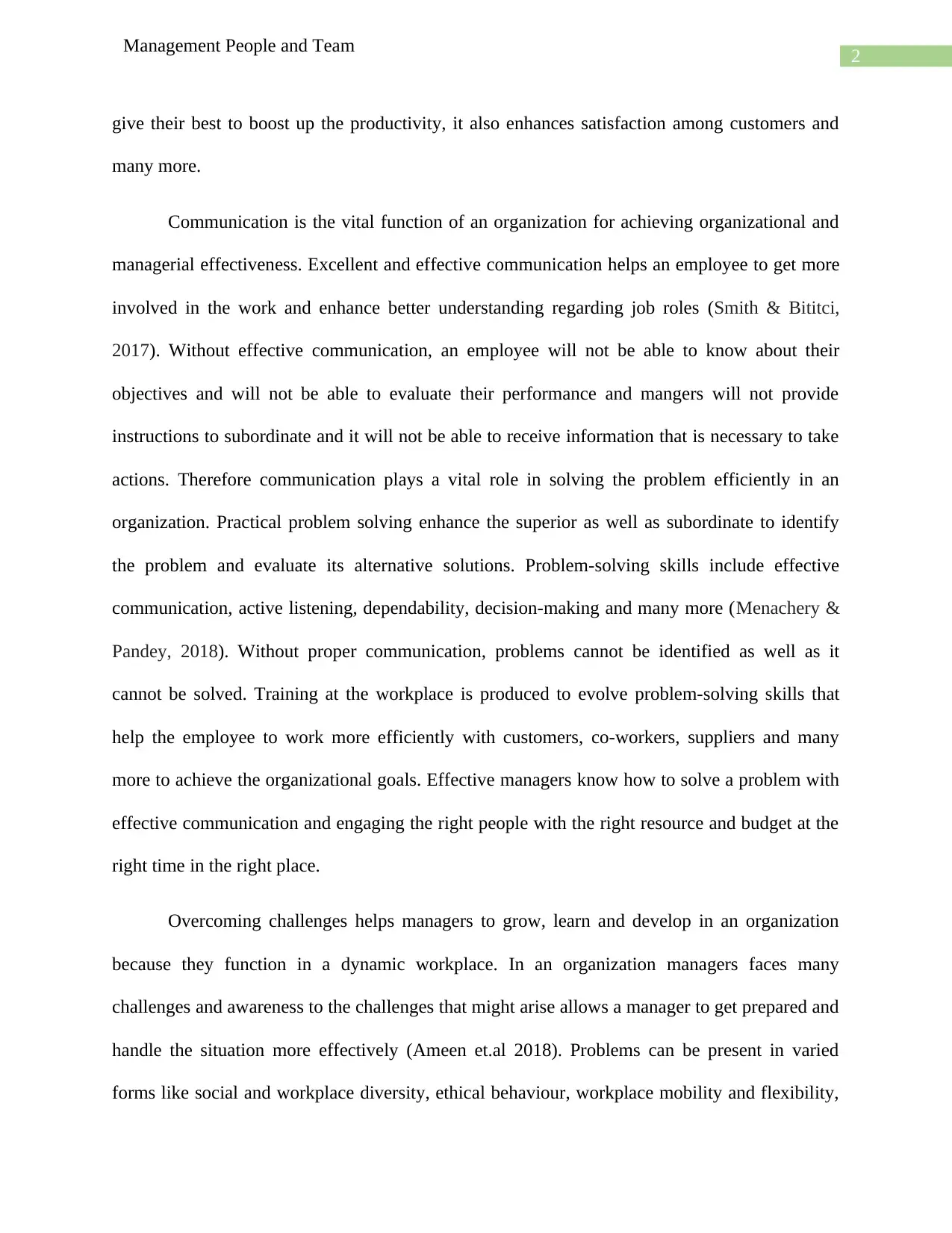
2
Management People and Team
give their best to boost up the productivity, it also enhances satisfaction among customers and
many more.
Communication is the vital function of an organization for achieving organizational and
managerial effectiveness. Excellent and effective communication helps an employee to get more
involved in the work and enhance better understanding regarding job roles (Smith & Bititci,
2017). Without effective communication, an employee will not be able to know about their
objectives and will not be able to evaluate their performance and mangers will not provide
instructions to subordinate and it will not be able to receive information that is necessary to take
actions. Therefore communication plays a vital role in solving the problem efficiently in an
organization. Practical problem solving enhance the superior as well as subordinate to identify
the problem and evaluate its alternative solutions. Problem-solving skills include effective
communication, active listening, dependability, decision-making and many more (Menachery &
Pandey, 2018). Without proper communication, problems cannot be identified as well as it
cannot be solved. Training at the workplace is produced to evolve problem-solving skills that
help the employee to work more efficiently with customers, co-workers, suppliers and many
more to achieve the organizational goals. Effective managers know how to solve a problem with
effective communication and engaging the right people with the right resource and budget at the
right time in the right place.
Overcoming challenges helps managers to grow, learn and develop in an organization
because they function in a dynamic workplace. In an organization managers faces many
challenges and awareness to the challenges that might arise allows a manager to get prepared and
handle the situation more effectively (Ameen et.al 2018). Problems can be present in varied
forms like social and workplace diversity, ethical behaviour, workplace mobility and flexibility,
Management People and Team
give their best to boost up the productivity, it also enhances satisfaction among customers and
many more.
Communication is the vital function of an organization for achieving organizational and
managerial effectiveness. Excellent and effective communication helps an employee to get more
involved in the work and enhance better understanding regarding job roles (Smith & Bititci,
2017). Without effective communication, an employee will not be able to know about their
objectives and will not be able to evaluate their performance and mangers will not provide
instructions to subordinate and it will not be able to receive information that is necessary to take
actions. Therefore communication plays a vital role in solving the problem efficiently in an
organization. Practical problem solving enhance the superior as well as subordinate to identify
the problem and evaluate its alternative solutions. Problem-solving skills include effective
communication, active listening, dependability, decision-making and many more (Menachery &
Pandey, 2018). Without proper communication, problems cannot be identified as well as it
cannot be solved. Training at the workplace is produced to evolve problem-solving skills that
help the employee to work more efficiently with customers, co-workers, suppliers and many
more to achieve the organizational goals. Effective managers know how to solve a problem with
effective communication and engaging the right people with the right resource and budget at the
right time in the right place.
Overcoming challenges helps managers to grow, learn and develop in an organization
because they function in a dynamic workplace. In an organization managers faces many
challenges and awareness to the challenges that might arise allows a manager to get prepared and
handle the situation more effectively (Ameen et.al 2018). Problems can be present in varied
forms like social and workplace diversity, ethical behaviour, workplace mobility and flexibility,
⊘ This is a preview!⊘
Do you want full access?
Subscribe today to unlock all pages.

Trusted by 1+ million students worldwide
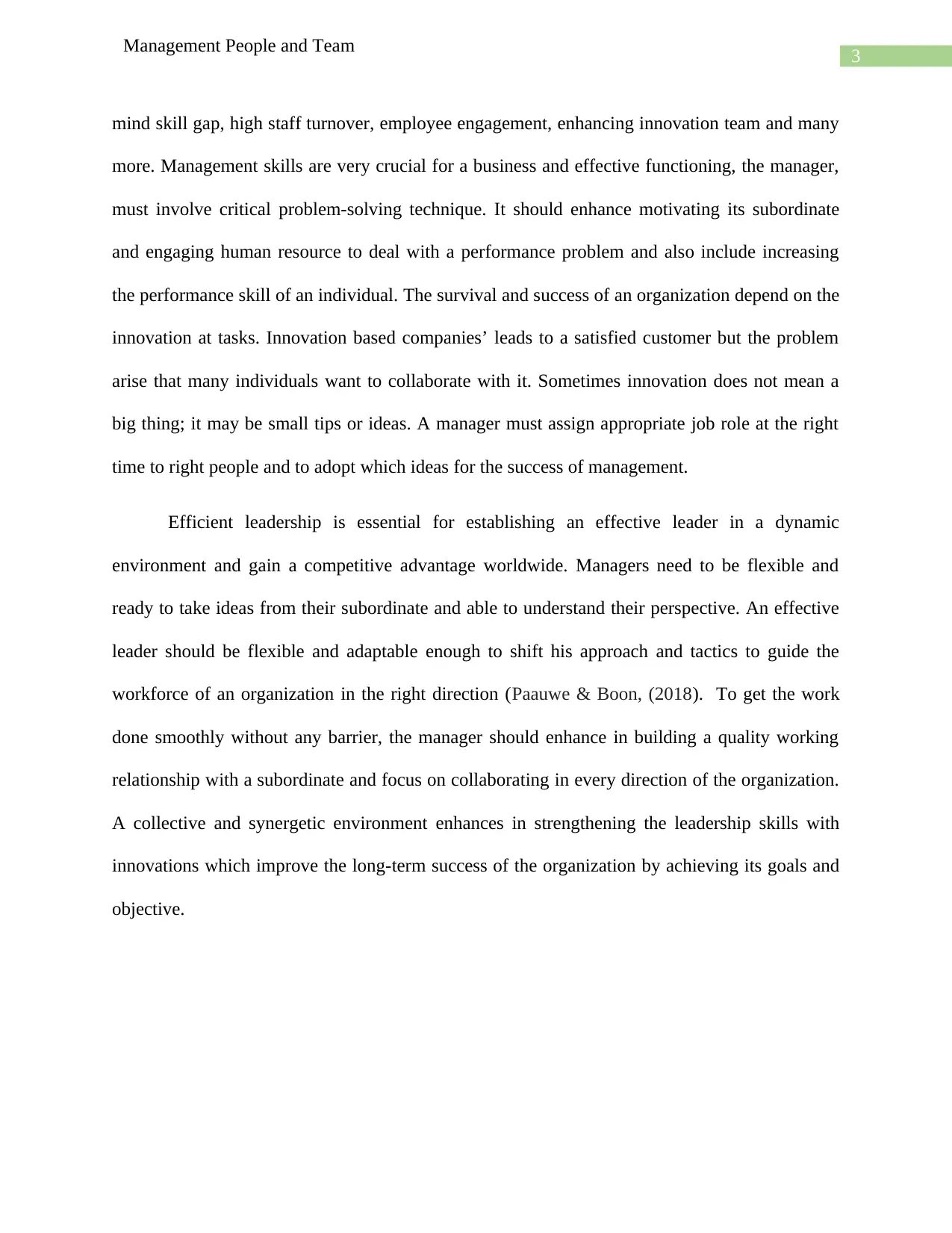
3
Management People and Team
mind skill gap, high staff turnover, employee engagement, enhancing innovation team and many
more. Management skills are very crucial for a business and effective functioning, the manager,
must involve critical problem-solving technique. It should enhance motivating its subordinate
and engaging human resource to deal with a performance problem and also include increasing
the performance skill of an individual. The survival and success of an organization depend on the
innovation at tasks. Innovation based companies’ leads to a satisfied customer but the problem
arise that many individuals want to collaborate with it. Sometimes innovation does not mean a
big thing; it may be small tips or ideas. A manager must assign appropriate job role at the right
time to right people and to adopt which ideas for the success of management.
Efficient leadership is essential for establishing an effective leader in a dynamic
environment and gain a competitive advantage worldwide. Managers need to be flexible and
ready to take ideas from their subordinate and able to understand their perspective. An effective
leader should be flexible and adaptable enough to shift his approach and tactics to guide the
workforce of an organization in the right direction (Paauwe & Boon, (2018). To get the work
done smoothly without any barrier, the manager should enhance in building a quality working
relationship with a subordinate and focus on collaborating in every direction of the organization.
A collective and synergetic environment enhances in strengthening the leadership skills with
innovations which improve the long-term success of the organization by achieving its goals and
objective.
Management People and Team
mind skill gap, high staff turnover, employee engagement, enhancing innovation team and many
more. Management skills are very crucial for a business and effective functioning, the manager,
must involve critical problem-solving technique. It should enhance motivating its subordinate
and engaging human resource to deal with a performance problem and also include increasing
the performance skill of an individual. The survival and success of an organization depend on the
innovation at tasks. Innovation based companies’ leads to a satisfied customer but the problem
arise that many individuals want to collaborate with it. Sometimes innovation does not mean a
big thing; it may be small tips or ideas. A manager must assign appropriate job role at the right
time to right people and to adopt which ideas for the success of management.
Efficient leadership is essential for establishing an effective leader in a dynamic
environment and gain a competitive advantage worldwide. Managers need to be flexible and
ready to take ideas from their subordinate and able to understand their perspective. An effective
leader should be flexible and adaptable enough to shift his approach and tactics to guide the
workforce of an organization in the right direction (Paauwe & Boon, (2018). To get the work
done smoothly without any barrier, the manager should enhance in building a quality working
relationship with a subordinate and focus on collaborating in every direction of the organization.
A collective and synergetic environment enhances in strengthening the leadership skills with
innovations which improve the long-term success of the organization by achieving its goals and
objective.
Paraphrase This Document
Need a fresh take? Get an instant paraphrase of this document with our AI Paraphraser
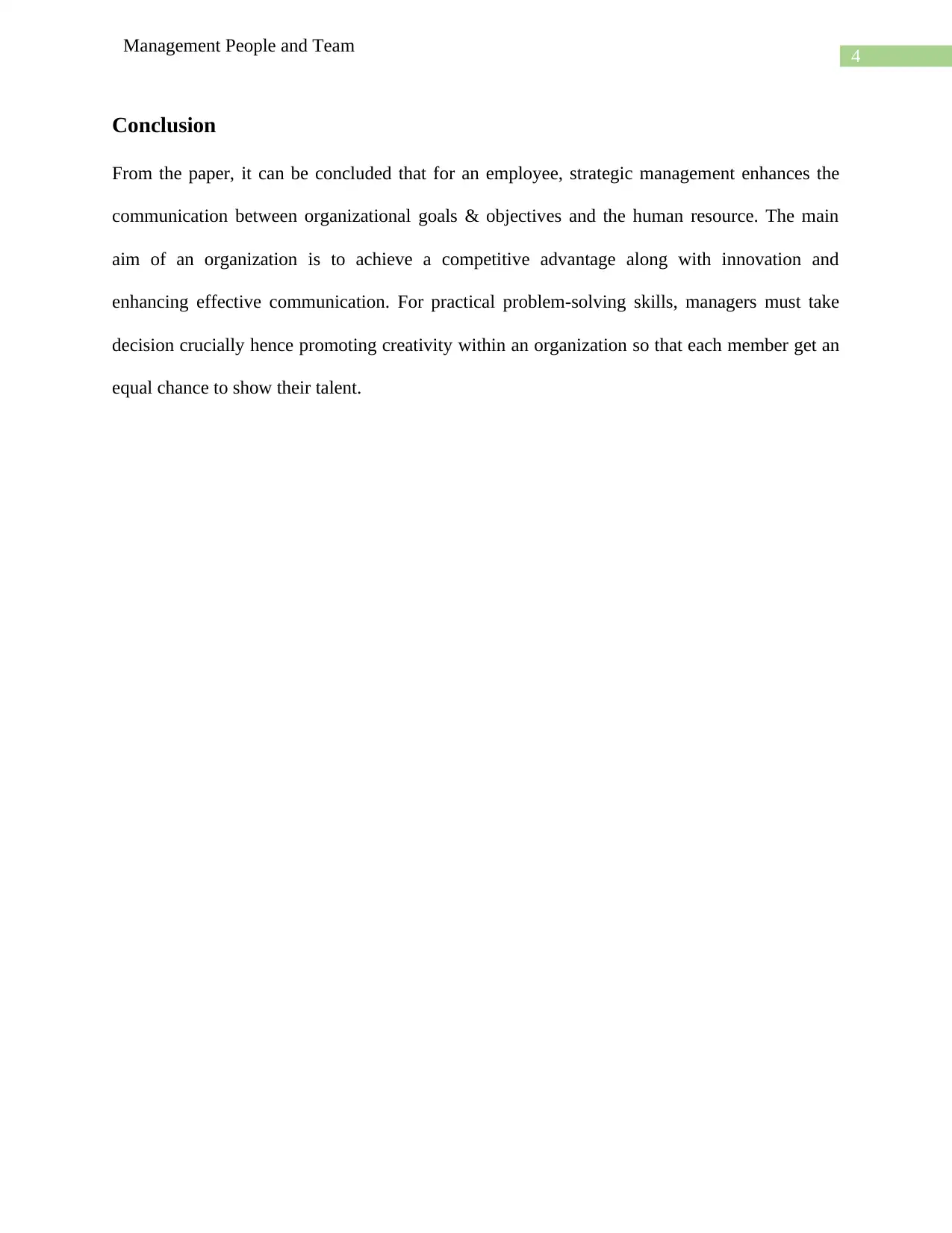
4
Management People and Team
Conclusion
From the paper, it can be concluded that for an employee, strategic management enhances the
communication between organizational goals & objectives and the human resource. The main
aim of an organization is to achieve a competitive advantage along with innovation and
enhancing effective communication. For practical problem-solving skills, managers must take
decision crucially hence promoting creativity within an organization so that each member get an
equal chance to show their talent.
Management People and Team
Conclusion
From the paper, it can be concluded that for an employee, strategic management enhances the
communication between organizational goals & objectives and the human resource. The main
aim of an organization is to achieve a competitive advantage along with innovation and
enhancing effective communication. For practical problem-solving skills, managers must take
decision crucially hence promoting creativity within an organization so that each member get an
equal chance to show their talent.
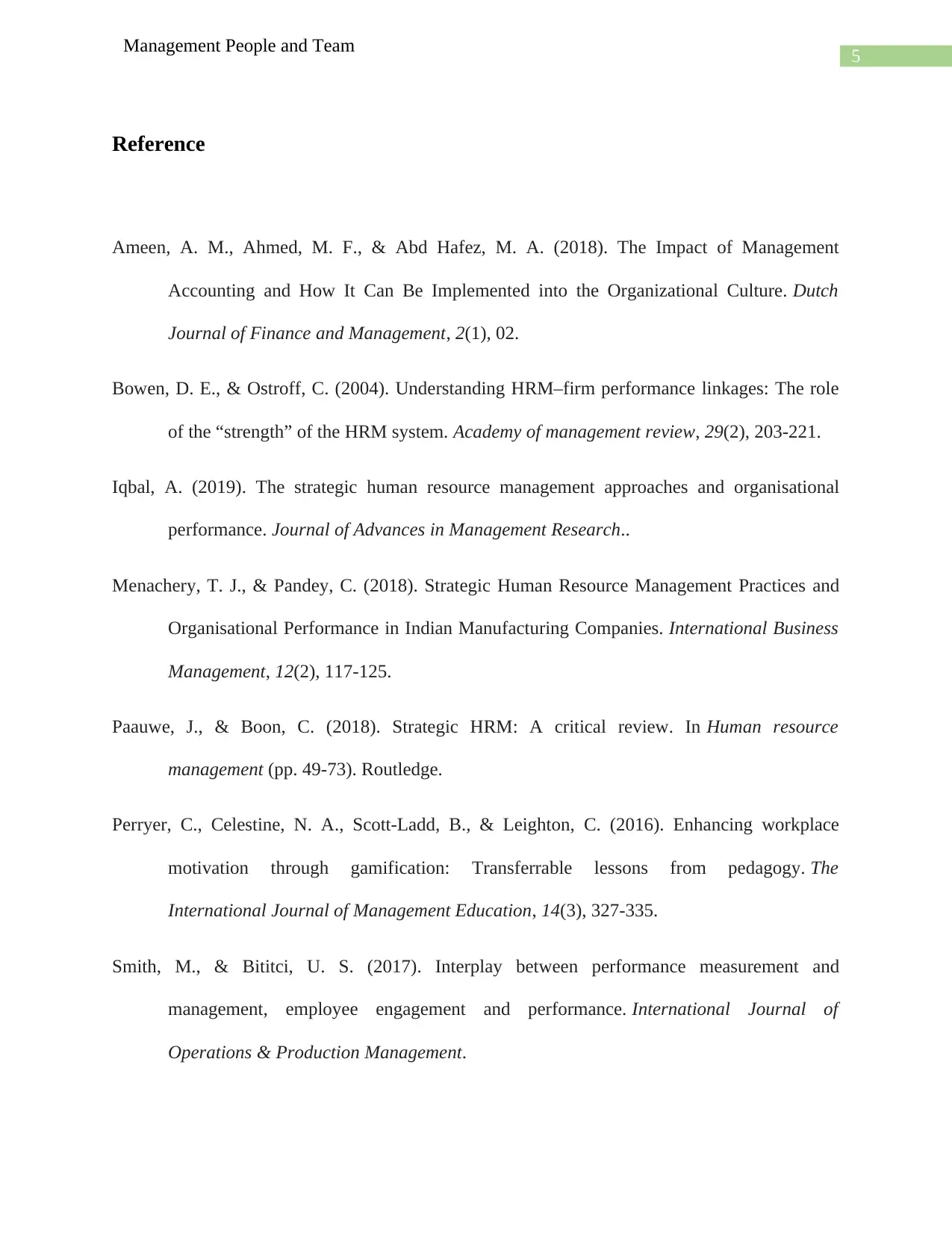
5
Management People and Team
Reference
Ameen, A. M., Ahmed, M. F., & Abd Hafez, M. A. (2018). The Impact of Management
Accounting and How It Can Be Implemented into the Organizational Culture. Dutch
Journal of Finance and Management, 2(1), 02.
Bowen, D. E., & Ostroff, C. (2004). Understanding HRM–firm performance linkages: The role
of the “strength” of the HRM system. Academy of management review, 29(2), 203-221.
Iqbal, A. (2019). The strategic human resource management approaches and organisational
performance. Journal of Advances in Management Research..
Menachery, T. J., & Pandey, C. (2018). Strategic Human Resource Management Practices and
Organisational Performance in Indian Manufacturing Companies. International Business
Management, 12(2), 117-125.
Paauwe, J., & Boon, C. (2018). Strategic HRM: A critical review. In Human resource
management (pp. 49-73). Routledge.
Perryer, C., Celestine, N. A., Scott-Ladd, B., & Leighton, C. (2016). Enhancing workplace
motivation through gamification: Transferrable lessons from pedagogy. The
International Journal of Management Education, 14(3), 327-335.
Smith, M., & Bititci, U. S. (2017). Interplay between performance measurement and
management, employee engagement and performance. International Journal of
Operations & Production Management.
Management People and Team
Reference
Ameen, A. M., Ahmed, M. F., & Abd Hafez, M. A. (2018). The Impact of Management
Accounting and How It Can Be Implemented into the Organizational Culture. Dutch
Journal of Finance and Management, 2(1), 02.
Bowen, D. E., & Ostroff, C. (2004). Understanding HRM–firm performance linkages: The role
of the “strength” of the HRM system. Academy of management review, 29(2), 203-221.
Iqbal, A. (2019). The strategic human resource management approaches and organisational
performance. Journal of Advances in Management Research..
Menachery, T. J., & Pandey, C. (2018). Strategic Human Resource Management Practices and
Organisational Performance in Indian Manufacturing Companies. International Business
Management, 12(2), 117-125.
Paauwe, J., & Boon, C. (2018). Strategic HRM: A critical review. In Human resource
management (pp. 49-73). Routledge.
Perryer, C., Celestine, N. A., Scott-Ladd, B., & Leighton, C. (2016). Enhancing workplace
motivation through gamification: Transferrable lessons from pedagogy. The
International Journal of Management Education, 14(3), 327-335.
Smith, M., & Bititci, U. S. (2017). Interplay between performance measurement and
management, employee engagement and performance. International Journal of
Operations & Production Management.
⊘ This is a preview!⊘
Do you want full access?
Subscribe today to unlock all pages.

Trusted by 1+ million students worldwide
1 out of 6
Related Documents
Your All-in-One AI-Powered Toolkit for Academic Success.
+13062052269
info@desklib.com
Available 24*7 on WhatsApp / Email
![[object Object]](/_next/static/media/star-bottom.7253800d.svg)
Unlock your academic potential
Copyright © 2020–2025 A2Z Services. All Rights Reserved. Developed and managed by ZUCOL.




